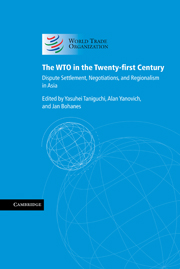Book contents
- Frontmatter
- Contents
- Notes on contributors
- Acknowledgements
- Table of dispute settlement cases and reports
- List of abbreviations
- Introduction
- PART I The WTO at Ten
- PART II Accomplishments and Future Prospects of the WTO Dispute Settlement System
- PART III Asian Perspectives on WTO Dispute Settlement
- PART IV The Doha Development Agenda and Beyond
- PART V Asian Regional Integration and the Multilateral Trading System
- 22 The adoption of the ‘Best Practices’ for regional and free trade agreements in APEC: a road towards more WTO-consistent regional trade agreements?
- 23 Trade remedy systems for East Asian free trade agreements
- 24 Free trade agreements in Asia and some common legal problems
- 25 Dispute settlement under free trade agreements: its interaction and relationship with WTO dispute settlement procedures
- 26 Regionalism under the WTO and the prospect of an East Asian free trade area
- Index
22 - The adoption of the ‘Best Practices’ for regional and free trade agreements in APEC: a road towards more WTO-consistent regional trade agreements?
from PART V - Asian Regional Integration and the Multilateral Trading System
Published online by Cambridge University Press: 05 March 2012
- Frontmatter
- Contents
- Notes on contributors
- Acknowledgements
- Table of dispute settlement cases and reports
- List of abbreviations
- Introduction
- PART I The WTO at Ten
- PART II Accomplishments and Future Prospects of the WTO Dispute Settlement System
- PART III Asian Perspectives on WTO Dispute Settlement
- PART IV The Doha Development Agenda and Beyond
- PART V Asian Regional Integration and the Multilateral Trading System
- 22 The adoption of the ‘Best Practices’ for regional and free trade agreements in APEC: a road towards more WTO-consistent regional trade agreements?
- 23 Trade remedy systems for East Asian free trade agreements
- 24 Free trade agreements in Asia and some common legal problems
- 25 Dispute settlement under free trade agreements: its interaction and relationship with WTO dispute settlement procedures
- 26 Regionalism under the WTO and the prospect of an East Asian free trade area
- Index
Summary
States have a fundamental right to form regional trade agreements
Historically, States have always formed closer links with some other States for, inter alia, cultural, trade and security reasons. When they created the General Agreement of Tariffs and Trade (GATT) in 1947, States could not ignore this economic and political reality; hence the inclusion of Article XXIV, which recognizes the right (albeit conditional) of States to form preferential regional trade agreements (RTAs). The philosophy of the GATT/World Trade Organization (WTO) disciplines with respect to RTAs is to ensure that the formation and evolution of such preferential arrangements support the multilateral trading system. Since multilateral trade is about greater trade opening, RTAs have to be supportive of this principle: RTAs should facilitate trade between the constituent territories and not raise barriers to the trade of non-RTA States. This principle is reflected in paragraph 4 of Article XXIV:
The contracting parties recognize the desirability of increasing freedom of trade by the development, through voluntary agreements, of closer integration between the economies of the countries parties to such agreements. They also recognize that the purpose of a customs union or of a free-trade area should be to facilitate trade between the constituent territories and not to raise barriers to the trade of other contracting parties with such territories. (Italics added)
As stated by the Appellate Body in the context of its discussion of the general exceptions in Article XX of the GATT 1994, WTO market access obligations must be balanced against the right of WTO Members to invoke exception provisions.
- Type
- Chapter
- Information
- The WTO in the Twenty-first CenturyDispute Settlement, Negotiations, and Regionalism in Asia, pp. 409 - 422Publisher: Cambridge University PressPrint publication year: 2007
- 2
- Cited by

